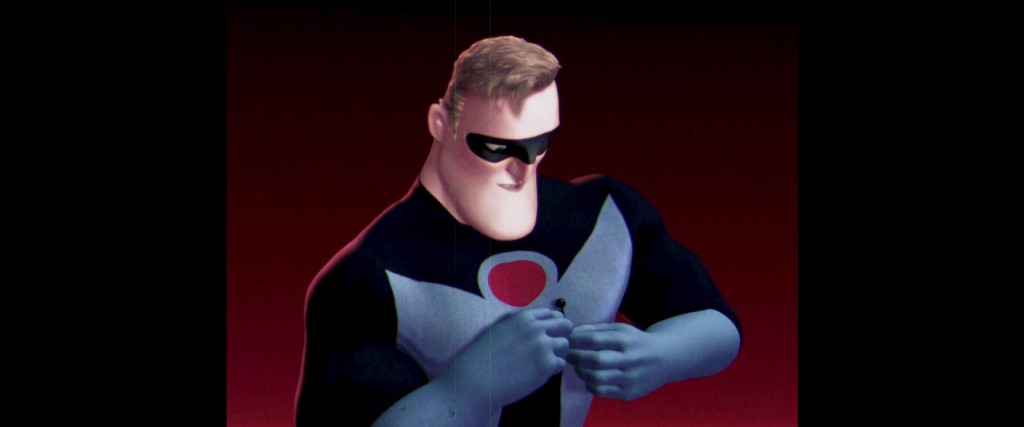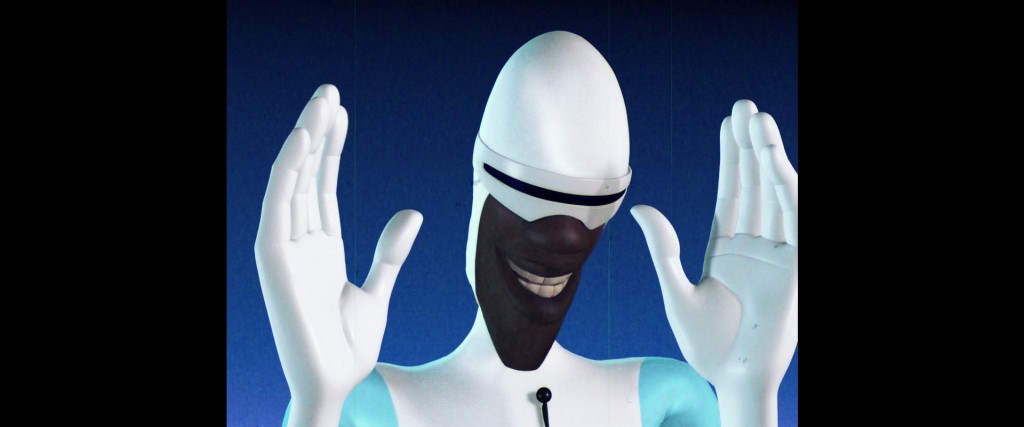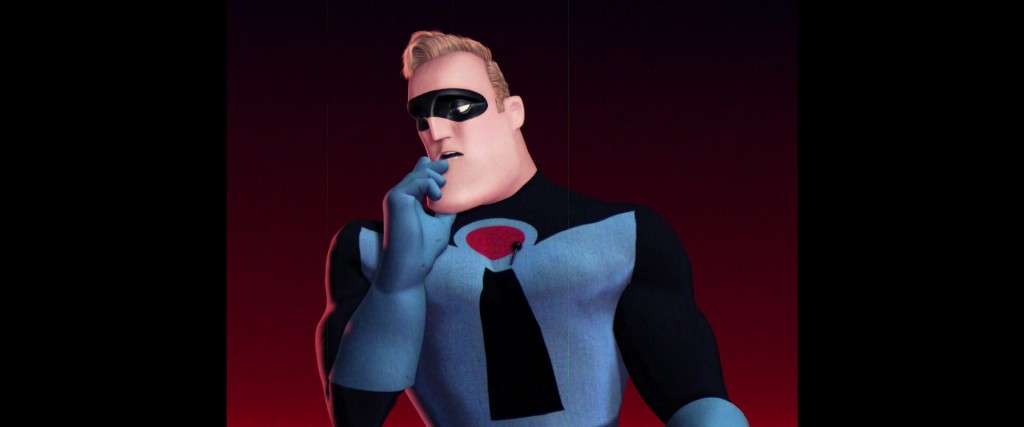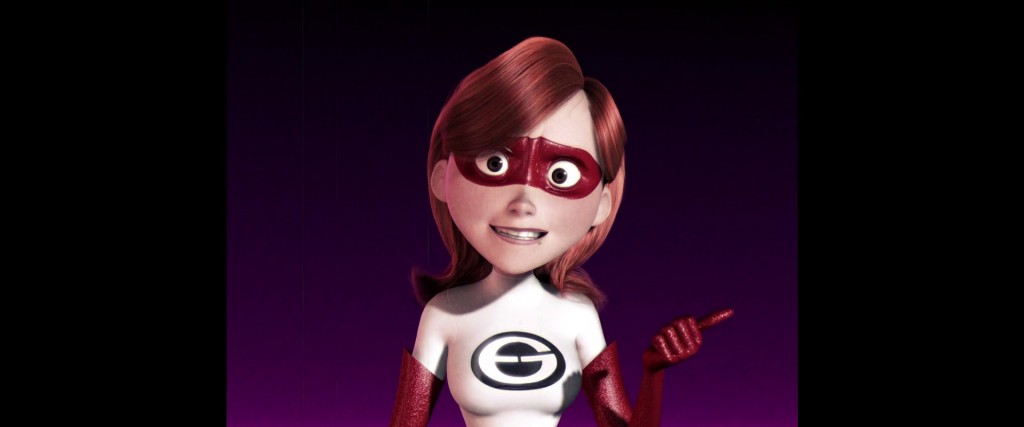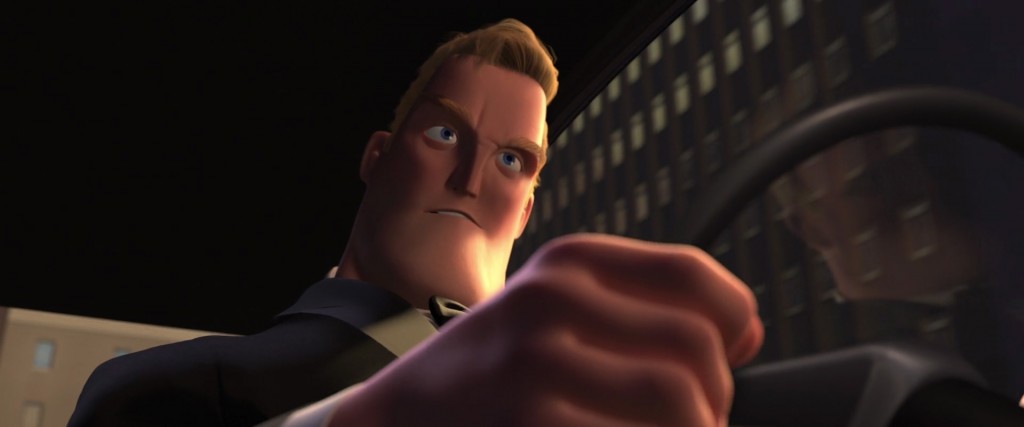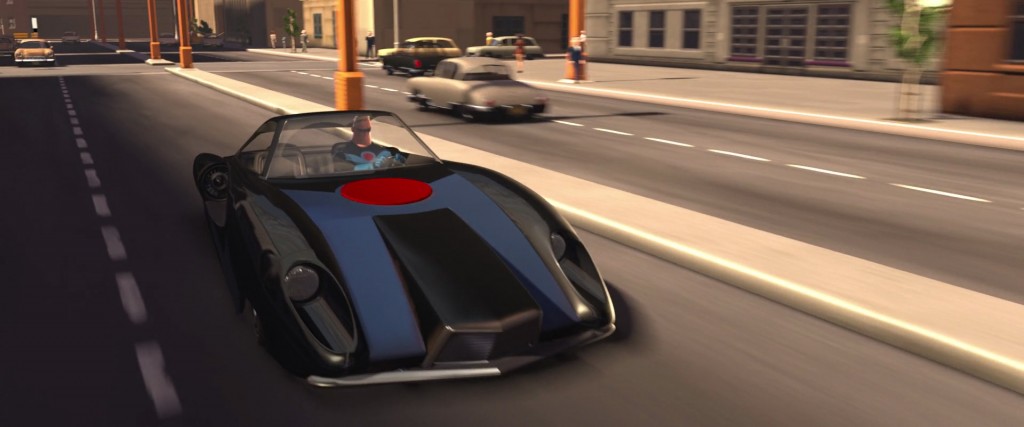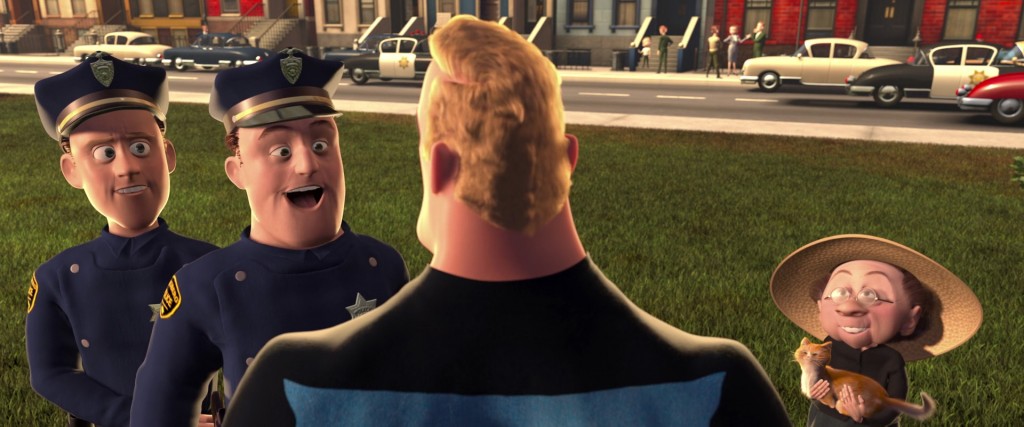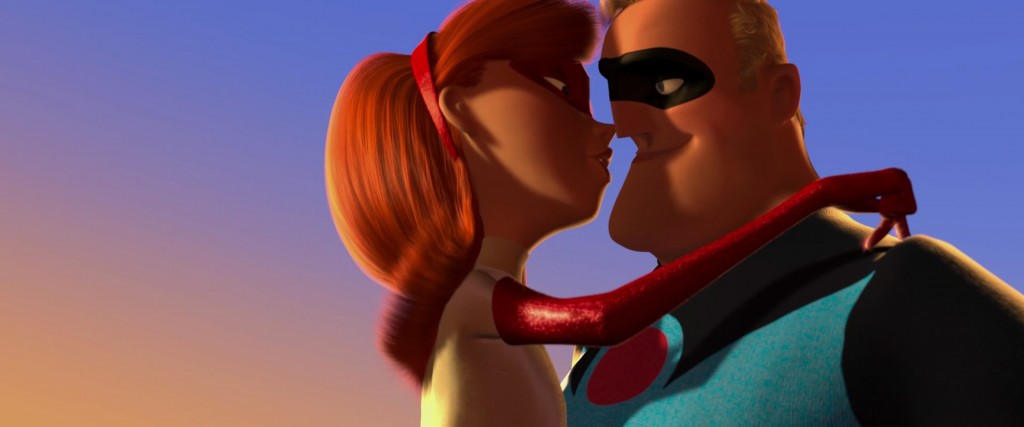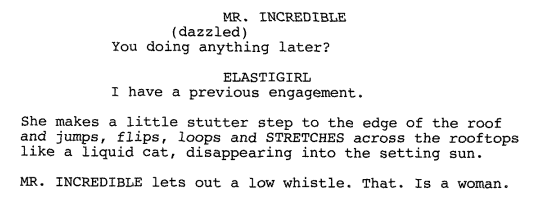There are a hundred ways to measure what makes a great movie, but nothing speaks more highly about a film than how closely you can read it. In his new feature, Deadshirt Editor-In-Chief Dylan Roth explores one of his favorite films by demonstrating just how much there is to talk about, writing at length about Every Five Minutes of runtime.
THE INCREDIBLES
Written and Directed by Brad Bird
(c) 2004 Disney/Pixar
(00:27-02:03) Talking Heads
The Incredibles begins quietly, with a brief sequence of vintage-style interviews with three of the film’s main characters. Opening your movie by having your leads talk directly into the camera is typically a pretty cheap conceit, but in The Incredibles it not only provides exposition but also sets up many of the themes and character motivations in subtle, clever ways.
First and foremost, the interview segments are “shot” to look like old 16mm film, which establishes that The Incredibles will be something of a period piece. The first clear image of the film is of masked superhero Mr. Incredible (voiced by Craig T. Nelson) awkwardly struggling to affix a small wireless shirt microphone to his costume. Beyond the obvious foreshadowing of the movie’s themes (a man with superpowers is failing to accomplish a simple mundane task), there’s also quiet world-building being done just in these first few seconds. We’re watching an aged movie of a man pinning on a small wireless microphone. This movie doesn’t exist in any time or world that we’ve ever known. This is made more obvious once the film goes into full swing, but it’s also right there in the first piece of information presented to the audience.
After a moment, Mr. Incredible is more composed, smiling, casually participating in a conversation with an off-screen interviewer. The audience is never provided with any specific explanation for the interview (the screenplay describes it as a documentary), but the informal, comfortable attitude of Mr. Incredible (and the following two interviewees) makes it clear that this kind of thing is part of the everyday life of a superhero. Mr. Incredible isn’t just a crimefighter; he’s also a celebrity, accustomed to attention. He seems to enjoy it.
We hear only one of the interviewer’s questions:
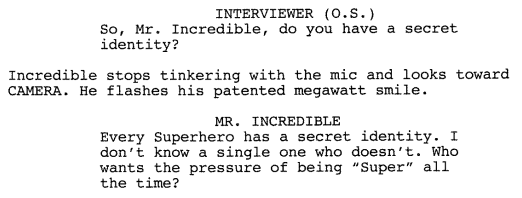
Boom, we’ve established two of the key elements of the film right there. First, the importance of a secret identity, which figures heavily into the plot of the film. Second, a key question that each character asks him/herself throughout the story: “Who wants the pressure of being ‘Super?'”
It’s in addressing this question that each of the interviewees gets to establish their character in a fun way that drips with dramatic irony upon repeat viewings.
Frozone (Samuel L. Jackson) definitely falls into some “cool black best friend” cliches, but by God he’s great at it. Presented here as a suave ladies’ man, Frozone boasts about his super-powered girlfriends and how uninterested he is in learning about their comparably boring lives out of costume. So, of course, later on in the film, Frozone/Lucius Best becomes the henpecked husband of Honey, an apparent civilian who openly opposes his “derring-do.” (She also never appears on screen, but actress/Pixar crew member Kimberly Adair Clark still manages to steal a scene as the voice of Honey.)
Mr. Incredible jokes about how sometimes he wishes the world would just “STAY SAVED for a little bit.” It’s a classic Superman dilemma—if you have the power to save lives every day, how do you justify taking a day off? There’s always something you can be doing, always a crime being committed, always a fire to put out. Here, Mr. Incredible says one day he’d like to give it all up and have an ordinary life. The twist, of course, is that one of Mr. Incredible/Bob Parr’s chief antagonists in the story of The Incredibles is An Ordinary Life, and how addicted he becomes to feeling special and making a difference.
The prologue’s final testimonial comes from Elastigirl (Holly Hunter), a fierce and funny young superheroine who does not share Mr. Incredible’s desire to give up crimefighting. Elastigirl sees herself as not only a “top dog” in the superhero game, but also something of a feminist symbol. “Girls, c’mon,” she says, addressing the viewing audience. “Leave the saving of the world to the men? I don’t think so.” Elastigirl is aware of the importance of superheroes as aspirational figures, and that her giving up could mean someone who looks up to her might give up, too. In just a few short lines, Elastigirl’s testimony speaks to so much of her character’s arc, from embracing retirement from crimefighting and dedicating her life to her family, to her quiet guilt over forcing her children to hide their powers, to her refusal to stay out of harm’s way and let her husband fight alone when the going gets rough.
This is all set up in ninety seconds.
(02:10-05:45) Municiberg: The Golden Age
The title card and Michael Giacchino’s score kick the movie into full-color widescreen bombast as The Incredibles begins in earnest. Brad Bird’s Oscar-nominated screenplay puts it best:
It’s here that we first meet Mr. Incredible out of costume as Bob, who looks to be in his early thirties and is behind the wheel of a flashy black coupe. He’s dressed to the nines, wearing a black tuxedo and a red carnation. While the story will soon offer a logical explanation for his getup, it’s instant visual shorthand for James Bond-style sexy secret agent, and that’s not altogether wrong. While The Incredibles is definitely a superhero movie, its next most obvious cinematic inspiration is Sir Ken Adam’s production design for the first James Bond films, an influence which becomes more apparent further into the film.
At the very least, Bob thinks of himself as something of a James Bond figure, a suave, charming hero living a violent double life. Bob’s superpowers are strength and invulnerability, but those parts of his superhero persona are beyond his control. The rest of Mr. Incredible, the parts he crafts for himself, are much more super-spy than super-hero. It’s not just the cool transforming car, it’s his calm swagger, his one-liners, his barely contained appetite for destruction. This era’s Mr. Incredible, at the peak of his powers, is Bob’s idealized version of himself, an ideal he dreams of recapturing for the remainder of the film.
Following behind the car chase, Bob puts the car on autopilot as it transforms seamlessly into the sporty Incredibile, and the car’s automated gadgetry slips him into his blue and black Supersuit. (It’s capitalized in the script; don’t argue with me.) It zips right over the tux and still looks skintight, which is either meant to evoke the tux unzipping to reveal his true self underneath, or is just a cool side effect of being a cartoon and not beholden to normal physical laws.
Bob’s testosterone-fueled action fantasy is interrupted, however, when a little old lady walks right into the street ahead of his speeding car to seek his aid. Her emergency? Her cat, Squeaker, is stuck in a tree by the side of the road. Barely hiding his frustration, Mr. Incredible stops what he’s doing and helps the citizen with her comparably trivial concern. In addition to being a comedy beat, the Squeaker Dilemma also provides the audience with an education on the relationship between Supers and their protectees. Mr. Incredible is a beloved figure in Municiberg, and that adoration means a great deal to him, but it does have its drawbacks. The citizens he protects now count on him a little too much, and they expect him to drop everything for them. And he does, not just because he’s a hero, but because an unwavering commitment to his job is what it takes to stay in the public’s good graces. In just a few hours, Mr. Incredible will find out what happens when he puts his own needs first, even for a moment, and he won’t enjoy the results.
Being the top shelf superhero that he is, Mr. Incredible finds a way to solve both his problems—pulling Squeaker’s tree right out of the ground and shaking the cat off just in time to bring the criminals’ getaway car to a sudden arboreal stop.
The police from the car chase are clearly as much his admirers as the rest of the city, and Mr. Incredible feigns modesty as he receives their thanks. “I’m just here to help,” he says, and that’s mostly true, but as his car’s police scanner informs him of a tour bus robbery in progress, Mr. Incredible’s face lights up at the prospect of another workout. He checks his watch, assures himself that he “still has time” before his tuxedo-related appointment, and hops back into the car, where he’s surprised to find teenage fanboy Buddy (Jason Lee) sitting shotgun and dressed in Mr. Incredible’s colors.
Buddy, or “IncrediBoy” as he now wants to be called, is Mr. Incredible’s number-one fan, and despite his domino mask, Bob recognizes him almost instantly from their dozens of previous encounters. Buddy has taken his obsession with his favorite superhero to a new extreme by inserting himself into Bob’s life and insisting he become his new sidekick. Bob’s patience with the kid is exhausted immediately, and in one of the coldest (and, from the outside, hilarious) dismissals of all time, immediately ejects Buddy from the vehicle, Goldfinger style.
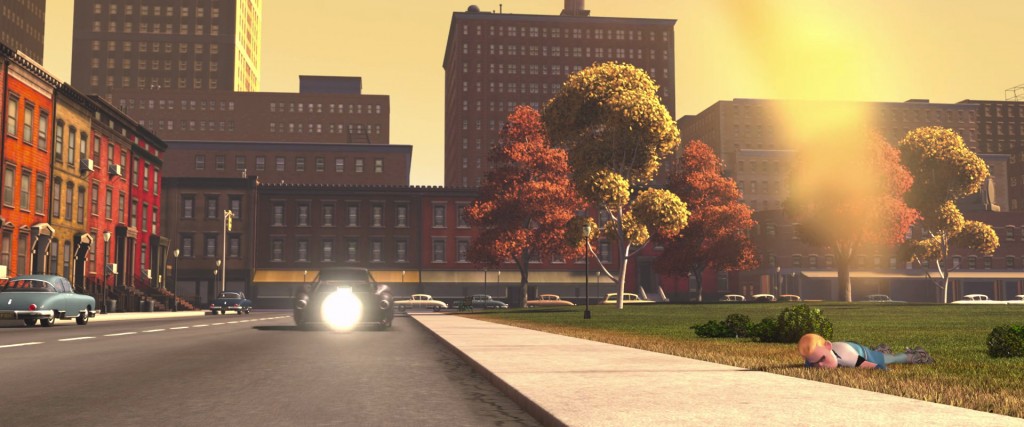
A famous man once said, “We create our own demons.”
Apparently too late to stop the bus robbery in progress, Mr. Incredible catches up with the thief on a rooftop. He’s about to make his arrest (after a caustic one-liner) when he’s interrupted by Elastigirl, who appears from out of nowhere to knock the perp out with one stretchy punch. Elastigirl and Mr. Incredible engage in fast-paced banter that feels almost rehearsed, as if they’ve had this exact interaction countless times, but the chemistry between the two is electrifying.
Though the entire interaction is a flirtatious dance, part of the exchange also foreshadows one of Bob’s key weaknesses: paternalism.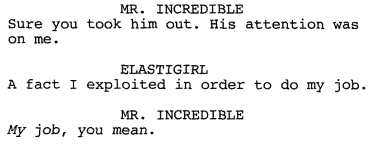
Here, in the moment, they’re just teasing each other, playing out a scene that’s clearly a regular part of their romantic relationship, but there’s an air of truth to when Mr. Incredible refers to being a superhero as his job, rather than Elastigirl’s. That Bob is passively sexist is something that gets revealed slowly over the course of the film, and it’s not until he can overcome his impulse to protect—rather than trust—the woman in his life that he’s truly able to become the best man he can be.
We’ve seen Mr. Incredible in the glorious daylight, but now the sun’s getting low, and the next five minutes are about to change everything. Stay tuned.
Check back next week for another installment of Every Five Minutes: The Incredibles. Screencaps are from DisneyScreencaps.com; the screenplay to The Incredibles can be found here.

